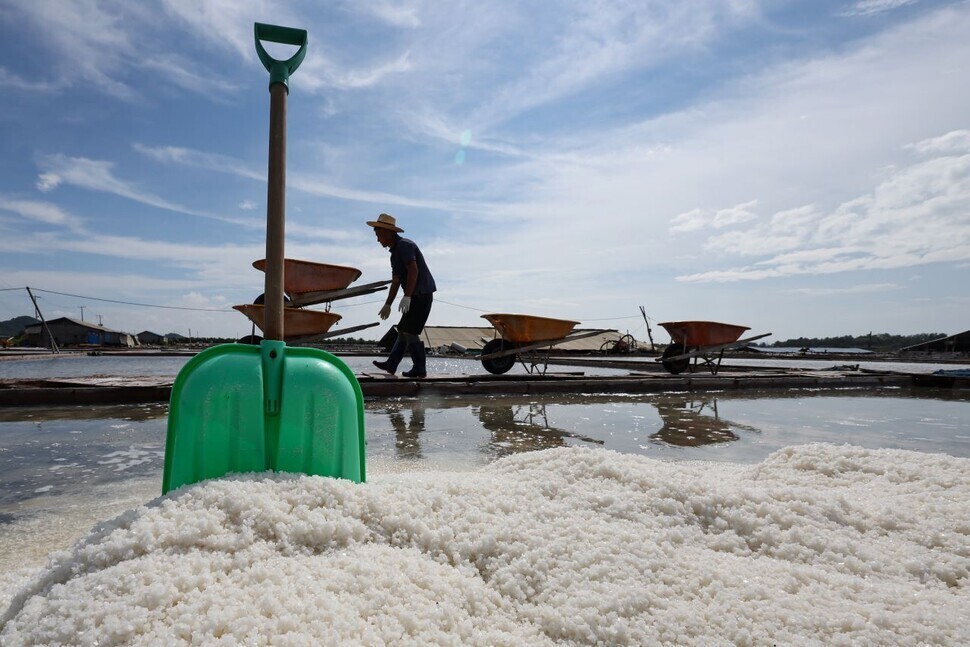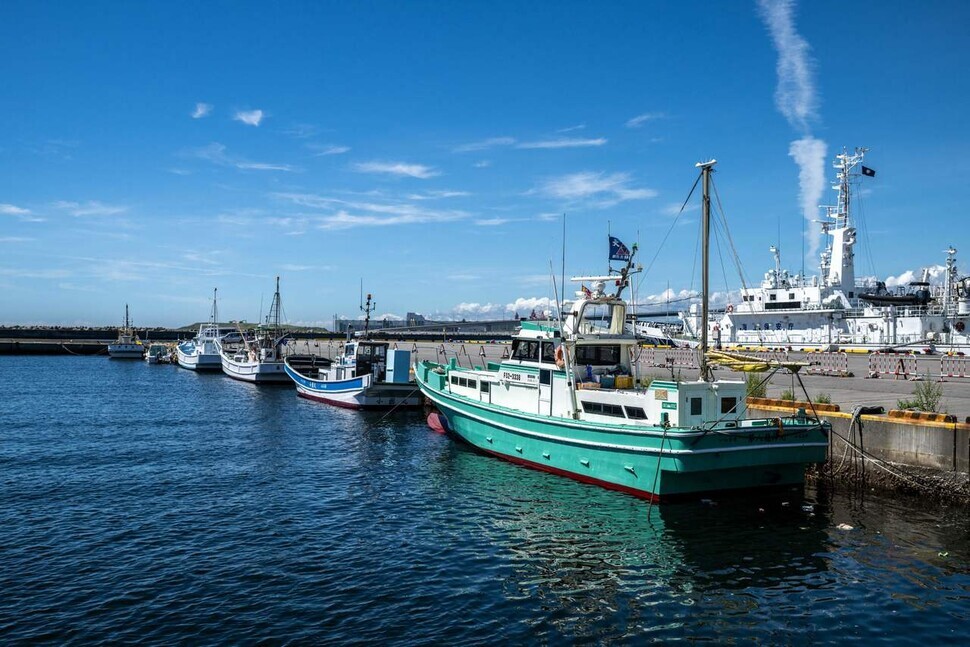hankyoreh
Links to other country sites 다른 나라 사이트 링크
Japan to start dumping irradiated Fukushima water into ocean as early as this week

The Japanese government is aiming to begin releasing radioactively contaminated water from the ruined Fukushima Daiichi nuclear plant into the ocean as early as Thursday.
In the name of revitalizing Fukushima, Japan seems to have finally decided to cross the Rubicon of dumping the irradiated wastewater into the ocean, despite objections from local fishers and neighboring countries.
Meeting with reporters at his office in Tokyo on Monday evening, Japanese Prime Minister Fumio Kishida announced plans for ministerial meeting on Tuesday morning to “once again confirm the safety of the release of contaminated water and the measures to take against damaging rumors, and decide on a specific schedule for the release of ALPS-treated water.”
Japanese media, including the Asahi Shimbun, quoted a government official as saying the government has entered the final stages of coordinating the release as early as Thursday.
As such, a meeting on Tuesday morning is expected to give the final green light to begin releasing water as early as Thursday.
Kishida’s rationale is that Fukushima’s revival is contingent on the decommissioning of the nuclear power plant there, but for that to happen, space needs to be cleared around the reactors.
“There are still 1,000 spent nuclear fuel units still in their storage pools. They need to be moved elsewhere,” the prime minister argued. “Where should we build a place for us to store the relocated rods, remnants, or debris, of the meltdown?”
Kishida said that removing more than 1,000 water tanks filled with contaminated water to make room is “an indispensable step for decommissioning” the plant.

Earlier in the day, Kishida met with Masanobu Sakamoto, the chairperson of Japan’s National Federation of Fisheries Cooperatives.
“We promise to take full responsibility for our actions, even if they take several decades to complete,” Kishida said at the meeting, adding that the government will ensure the discharge is completed in a safe manner so that fishers can continue in their line of work with peace of mind.
The government also announced that it will set aside funds in addition to the existing budget to deal with damage caused by reputational damage, such as the loss of sales due to worries over the discharge of contaminated water.
The government has been trying to convince fishers that it has set aside 30 billion yen in a fund for reputational damage and 50 billion yen in support measures to help them continue fishing.
Still, Sakamoto said his organization remains unchanged in its opposition to the dumping of the water, about which he says the government has “failed to obtain the support of fishers and the Japanese public.”
“Scientific safety and social peace of mind are two different things. Once the treated water is released, there are concerns about harmful rumors regarding the seafood, and fishermen cannot be assured about the safety of the water,” he stated.
Meanwhile, Kishida said that his government has heard from fishers that their understanding of the situation scientifically is deepening, and will treat that knowledge with respect and continue to communicate with them after the discharge.
The opposition from those whose livelihoods are tied to the sea has been one of the biggest challenges for the Japanese government when it comes to the release of contaminated water.
In 2015, the Japanese government and TEPCO, the operator of the nuclear power plant, made a promise to the Fukushima branch of the National Federation of Fisheries Cooperatives to not commence with any discharges without the understanding of related parties.
Fishers have criticized the Japanese government, saying it’s gone back on its word. This promise was used by the Japanese government to convince the fishers as much as possible, but in the end, the discharge seems likely to go ahead in the days to come without the full understanding of the fishers.
Internationally, China and Russia are the only countries whose governments have vocally opposed the discharge of contaminated water.
South Korean President Yoon Suk-yeol has said that he “trusts IAEA inspections,” effectively condoning the release of contaminated water.
According to an Asahi Shimbun poll, 75% of Japanese said the government’s efforts to stop the reputational damage to fish were “insufficient,” but 53% approved of the release itself.
By Kim So-youn, Tokyo correspondent; Cho Ki-weon, staff reporter
Please direct questions or comments to [english@hani.co.kr]

Editorial・opinion
![[Column] How tragedy pervades weak links in Korean labor [Column] How tragedy pervades weak links in Korean labor](https://flexible.img.hani.co.kr/flexible/normal/500/300/imgdb/original/2024/0703/8717199957128458.jpg) [Column] How tragedy pervades weak links in Korean labor
[Column] How tragedy pervades weak links in Korean labor![[Column] How opposing war became a far-right policy [Column] How opposing war became a far-right policy](https://flexible.img.hani.co.kr/flexible/normal/500/300/imgdb/original/2024/0702/5017199091002075.jpg) [Column] How opposing war became a far-right policy
[Column] How opposing war became a far-right policy- [Editorial] Korea needs to adjust diplomatic course in preparation for a Trump comeback
- [Editorial] Silence won’t save Yoon
- [Column] The miscalculations that started the Korean War mustn’t be repeated
- [Correspondent’s column] China-Europe relations tested once more by EV war
- [Correspondent’s column] Who really created the new ‘axis of evil’?
- [Editorial] Exploiting foreign domestic workers won’t solve Korea’s birth rate problem
- [Column] Kim and Putin’s new world order
- [Editorial] Workplace hazards can be prevented — why weren’t they this time?
Most viewed articles
- 110 days of torture: Korean mental patient’s restraints only removed after death
- 2In the blink of an eye, an unthinkable crash turned a night out into a nightmare
- 3[Column] How tragedy pervades weak links in Korean labor
- 4Experts cast doubt on driver’s claim that sudden unintended acceleration caused deadly crash
- 5[Column] How opposing war became a far-right policy
- 6Democrats seek to impeach 4 prosecutors, including those tied to probes into Lee Jae-myung
- 7Families, friends mourn loved ones cut down in prime in deadly car crash
- 81 in 10 marriages in Korea last year was with a foreign national
- 9Korea to create dedicated population strategy ministry to combat low birth rate, aging society
- 10KCC chief resigns to avoid impeachment, the second in 7 months